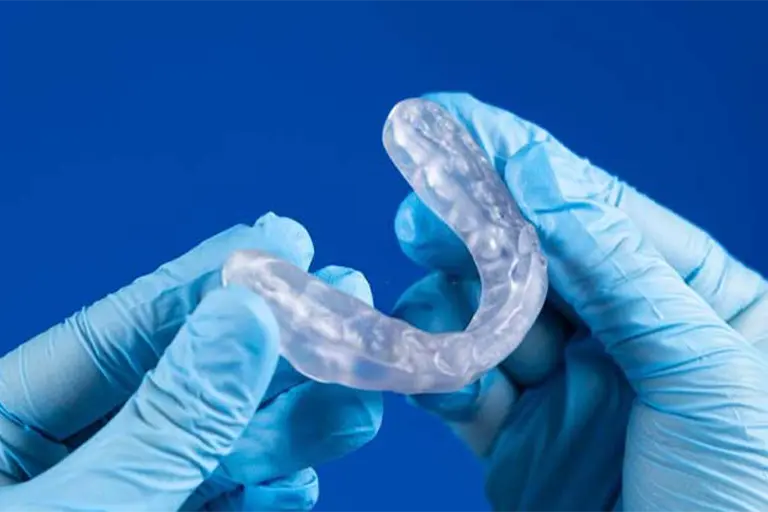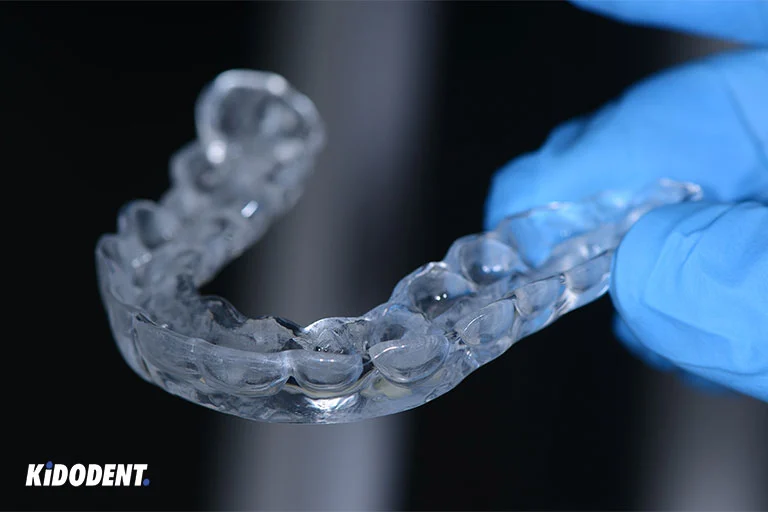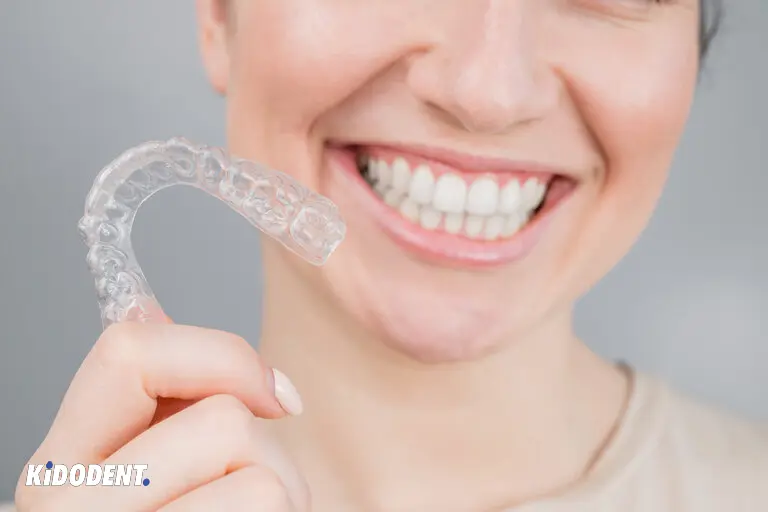Night guards are dental devices designed to protect teeth from the effects of teeth grinding or jaw clenching, the condition known as bruxism. But they are also a beneficial solution to improve TMJ disorders and sleep-related problems like sleep apnea or snoring. Night guards must be custom fitted if you want the best care for your teeth. However, some people may ask questions like can a night guard shift your teeth or change a bite? Read on to find out about this below.
What is a night guard?
A night guard, also called mouthguard or occlusal splint, is a custom-fitted oral appliance that you wear during sleep to protect teeth from grinding or clenching. Typically made of acrylic or soft plastic, night guards work by providing a thin cushioned layer between upper and lower teeth. This will prevent grinding and clenching force from breaking down or wearing teeth.
Mouthguards have several uses and benefits, including:
- Prevent tooth damage and jaw pain in people with bruxism condition—teeth grinding and jaw clenching.
- Provide occlusal condition and reduce certain jaw muscle pain like TMJ disorders
- Protect teeth from injuries during playing high contact sports like rugby, boxing, or basketball
- Help prevent snoring
- Improve sleep-related conditions such as obstructive sleep apnea
You can get a custom-made night guard from your dentist or purchase an over-the-counter custom one from companies online.
But be aware that there are one-size-fits-all types of night guards that don’t custom fit your teeth. The poor fit of these mouthguards can lead to pain in teeth and jaw and, if ignored, to teeth shifting and jaw misalignment.
Do night guards shift your teeth?
The simple answer is that if your night guard does not fit properly, it can potentially shift your teeth over time. Wearing an ill-fitting night guard can be very detrimental to your oral health and make problems with your TMJ or your bite.

Night guards or mouthguards should be custom-fitted and specifically designed to fit your teeth and jaw size. Once you get a custom-made night guard from your dentist, you will not experience any serious discomfort, nor teeth hurting and shifting.
Worn, while you sleep, a night guard is made to provide defense against the grinding force on your teeth. So, it is not meant to shift teeth.
How should I know my night guard doesn’t fit?
While you are wearing your custom-made night guard for the first time, it can be a bit uncomfortable and irritating in the first few days. So, if you are not accustomed to wearing mouthguards, this minor discomfort can be totally normal.
However, night guards shouldn’t give you feeling of pain or pressure. And if your teeth and jaw hurt and you feel some pressure on your teeth, there is something wrong with your night guard.
An ill-fitting night guard can put pressure on your teeth and cause continuous discomfort. Here are some signs to tell your night guard may not fit:
- Tooth pain
- Feeling of excess pressure on your teeth and gums
- Sore mouth
- Cuts and soreness in your cheeks and gums
- Jaw pain
- Mouth guard keeps falling out
If you experience any of the above symptoms, you need to stop using the night guard. It is important to contact your dentist to have a new one custom made for you or purchase a new custom-fitted mouthguard that you can mold to your teeth.
How to prevent a night guard from shifting your teeth?
Similar to other oral appliances, it is always important to consult your dentist before using any type of mouthguard. Using a custom-fit night guard helps secure your oral health and prevent teeth shifting. Otherwise, if used incorrectly, it can put pressure on your oral and dental structures and have counterproductive effects.
Here are some tips to prevent teeth shifting once you decide to wear a night guard:
Use the correct type of mouthguard
There are three main different types of mouthguards:
- Stock mouthguard. These are over-the-counter types that are ready which you pop into your mouth directly after opening the package. They are designed to fit any mouth, so these one-size-fits-all mouthguards are not at all an option for your teeth grinding night guard. They can be extremely bulky and uncomfortable in the mouth.
- Boil-and-bite mouthguards. These are another over-the-counter type of mouthguards which you can buy at your drugstore or online. You can create your own guard by sticking the material in boiling water and then biting down on it which you form an impression of your teeth. They are much more comfortable than stock mouthguards and provide better fit and protection. However, these mouthguards do not provide the protection required for teeth grinding and jaw clenching as dentist-made night guards do.
- Custom-made mouthguards. A custom night guard is the only type of night guard if you need a teeth grinding night guard with maximum protection and safety. You will not have any worries that your night guard may hurt your oral structures or shift your teeth. Crafted by professionals, they have higher quality and are made to fit your teeth.

Get a customized night guard
Your dentist can create a custom-fitted night guard specifically for your teeth grinding and clenching. They should first take dental exams and X-rays and check the bruxism signs to determine if you need to wear a night guard.
To create your night guard, your dentist needs to take an impression of your teeth which either sends it to the lab to make your custom-made night guard or fabricate it in their office.
There are also companies that offer custom-fitted night guards to prevent teeth grinding and clenching. These online retainers come with an impression kit to take an impression of your teeth at home. Once done, you will ship back the impression and they will make you the custom mouthguard.
Do keep in mind that if you need a night guard for other problems such as TMJ or sleep apnea, the mouthguards are different and should be made and designed by your dentist according to your condition.
Contact your dentist if your night guard hurt
Call your dentist immediately if your night guard feels tight, falls off, or hurts your teeth and is causing you pain. Your dentist can make a new one for you or examine the reason for your discomfort. They can refer you to an orthodontist if your teeth have shifted.
